
Parliament of India
High security at Parliament ahead of Obama's visit
Reports said that no visitors would be allowed inside Parliament When Obama addresses MPs on the evening of November 8. Further reports say hectic preparations are on in Parliament and the Central Hall has been closed for renovation. All construction activities will end in a week before Obama's visit. As per the tentative programme being worked out, the address by Obama would start at 5 pm. Sources said a welcome speech will be given by Vice President Hamid Ansari and a vote of thanks by Lok Sabha Speaker Meira Kumar. President Obama will also sign the Golden Book, the visitors' diary of Parliament. Winter Session of Parliament from Nov 9
Lok Sabha Secretariat on Monday issued a notification saying the session will commence on November 9 and subject to exigencies of government business, it is likely to conclude on 13th December. A similar notification has already been issued by the Rajya Sabha secretariat. Speaker Meira Kumar will hold an all-party meeting on the opening day of the session to seek cooperation of leaders to ensure that the proceedings are smooth. Obama, who will undertake his first state visit to India next month, will address Parliament on 8th November.\ Obama is expected to arrive in India on 5th November on a five-day visit, his first since assuming office in January last year. Former US President Bill Clinton had addressed a joint sitting during his visit in 2000. Obama's predecessor George W Bush, who visited India in March 2006, did not have the honour of addressing Parliament of the world's largest democracy. Among others to have addressed the Indian MPs at a joint session was former Japanese Prime Minister Shinzo Abe who visited India in August 2007. Obama is likely to begin his visit from Mumbai where he is expected to have an overnight stay at Taj Hotel, which was targeted by LeT terrorists during the 26/11 attacks in 2008. He is also expected to visit the Golden Temple in Amritsar besides Delhi where he will hold wide-ranging talks with Prime Minister Manmohan Singh. Indian Parliament adopts Nuclear Liability BillNEW DELHI, Aug 30: Paving the way for India to have nuclear commerce with the world, Parliament on Monday adopted a nuclear liability bill with the government insisting that the compensation package for victims matches that of the US and it was still open to accommodate some suggestions. With BJP on board after its suggestions were accepted, the Civil Liability for the Nuclear Damages Bill, 2010 was adopted by the Rajya Sabha by a voice vote after it rejected certain amendments moved by the Left parties. The bill, which is crucial for operationalisation of India's civil nuclear deals with the US and other countries, was passed by the Lok Sabha on August 25. Winding up a debate on the proposed legislation, Minister of State in the PMO Prithviraj Chavan said, "This is not a finality... We will take care of every single suggestion. If required, the bill will be changed for better." Responding to a number of proposals made by the members during the five-hour debate during which Prime Minister Manmohan Singh was present, Chavan said, "When we frame rules and regulations, we will keep the suggestions in mind." He said the bill provides for prompt "no-fault" compensation to victims in the event of a nuclear accident without bypassing the existing criminal laws. On questions over the quantum of compensation of Rs 1500 crore on the part of the operator, the minister said the amount, along with the 300 million dollar Special Drawing Rights ( SDR), is exactly the same which is provided in the US. He said besides Rs 1500 crore and 300 million SDRs, the bill provides for setting up a compensation fund. CPM member Sitaram Yechury, however, contested Chavan's contention that the compensation amount matches that of the US and moved an amendment for raising it to Rs 10,000 crore which was defeated. Amid repeated thumping of desks by the Prime Minister and other members of the ruling benches, Chavan said the government tried to reach out to the opposition by making 18 amendments to the bill. Praising the BJP for its support to the Bill, the minister said, "We took upon ourselves to carry forward the good work which was started by the NDA government." The BJP came on board to support the government on the bill after days of wrangling. The support of the main opposition came when the government agreed to drop some controversial words from the proposed legislation. Observing that passage of the bill would complete the journey which the Prime Minister undertook to the US five years ago, he said the opening up of the nuclear commerce would increase India nuclear power capacity from 4500 MW to 40,000-50,000 MW. The first step towards ending India's nuclear isolation since 1974 began in July 2005 when an atomic deal was signed with the US during Singh's visit there. Chavan said India would be the first country where liability has been fixed for suppliers as no other country has suffered Bhopal gas tragedy. Extending support to the bill, BJP asked the government not to be carried away by "phoney campaign" that no global supplier would be coming to India with the proposed law fixing the suppliers' liability in the event of the nuclear mishap. Initiating a debate on the bill which was passed by the Lok Sabha, Leader of Opposition Arun Jaitley said the government should not be "apologetic" about inserting a clause making supplier along with operator liable for any nuclear incident. Referring to recent reports that reactor supplier from several countries would not be interested to come to India, he described it as "phoney campaign". Making a spirited speech, Chavan said India needed cooperation with the international community in the nuclear field as its own uranium resources are not adequately exploited, preventing adequate utilisation of atomic plants. He said the country has 1,47,000 tonnes of known uranium resources but in certain areas like those in Meghalaya and Andhra Pradesh, mining is yet to begin because of "local" and environmental reasons. The bill was taken up for consideration after days of intense bitterness between the government and opposition parties over the language regarding supplier liability. A clause on supplier was subsequently rephrased after negotiations with the opposition including a couple of meetings convened by Finance Minister Pranab Mukherjee to break the deadlock. The original version of the amendment had come under sharp attack from the BJP and Left parties as it provided for proving the "intent" of a supplier of causing an accident if an operator were to claim compensation. The parties had contended that it was impossible to prove an intent on the part of suppliers or their employees in case of an accident. The controversial word "intent" found its mention in an earlier government amendment, which was different from the one recommended by the Parliamentary Committee that examined the bill. On questions over the clause under which the government will be taking full responsibility of liability for plants not run by the government, Chavan said this had been done to prevent any insurance company official from visiting "certain" installations for strategic reasons. He said the government is in talks with four companies from the US, France, Japan and Russia for supplying of reactors. The minister also insisted that the cost of nuclear power would be comparable with coal-based energy. With regard to the country's domestic nuclear programme, Chavan said work is going on for development of Thorium-based programme as part of energy security. He also allayed apprehensions on account of management of nuclear waste, saying spent fuel would be reprocessed and the residue would be carefully stored. Chavan also said there was a need for taking a relook at the Public Liability Act of 1991, enacted after the Bhopal gas tragedy, as the compensation amount is too low at Rs 25,000 for death. After Chavan responded to all the queries raised by members, the Prime Minister reminded him that he had forgotten to give clarification to the question asked by Satish Mishra ( BSP). Mishra wanted to know the period by which a victim could claim compensation. Chavan said the period was 20 years. Lok Sabha adopts nuclear liability BillNEW DELHI, Aug 25: With the government conceding a major point to the Opposition on supplier liability, the Lok Sabha on Wednesday passed the controversial Civil Liability for Nuclear Damage Bill, 2010. Intervening in the five hour-long debate on the Bill and seeking “unanimous support” for it, Prime Minister Manmohan Singh said it marked the “completion of a journey to end the apartheid against India in the field of atomic power.” He vehemently rejected the charge of Opposition MPs that the law was being brought to promote American interests. The United Progressive Alliance managed to get the support of the Opposition parties for the Bill after it dropped the contentious provision of “intent” as a precondition for holding suppliers liable for a nuclear accident caused by defective equipment. With the BJP and the Left proposing similar language, a government amendment rectifying Section 17(b) sailed through unanimously. In all, the House adopted 18 amendments moved by the government before passing the Bill by voice vote. An amendment moved by CPI(M) leader Basudeb Acharia to fix the liability cap on suppliers in case of accidents at Rs.10,000 crore instead of the Rs.1,500 crore as mentioned in the Bill was defeated, with 252 members voting against it and 25 in favour. Initiating the debate, BJP leader Jaswant Singh criticised the government's “sleight of hand” in drafting the law and its attempts to “hustle” it through Parliament. Asserting that India's ambitious plans in the nuclear sector meant it was a “buyer's market,” he asked the government to take the larger concerns of Indians on board and not those of foreign suppliers. Replying to the debate on the Bill, Minister of State in the Prime Minister's Office Prithviraj Chavan countered the Opposition's charge that the government was in a hurry to push the Bill before U.S. President Barrack Obama's visit to India. There was no deadline fixed as “we are already five years too late” and it could not be delayed any more, he said. It was “unfair” to say the Bill had something to do with Mr. Obama's visit as the Presidents of Russia and France too had visited here earlier and India had signed nuclear agreements with those countries. He said the criminal liability laws were always there to protect victims and that the amount of compensation they would be entitled to was “unlimited” since the government would accept whatever amount was decided by the Claims Commissioner. Mr. Chavan made it clear that the country's three-phase nuclear research programme would not be compromised because of the Bill. Gurudas Dasgupta (CPI) said nuclear power production was extremely costly and the government had not worked out the cost of importing 40 nuclear reactors. Among the other MPs who intervened, Manish Tiwari (Congress) said the first initiatives for ending India's nuclear isolation were taken by Jaswant Singh when he held talks with the U.S. in 1999. “When Manmohan Singh took over as the Prime Minister, he only took that forward … If India wants progress, then we have to have nuclear energy.” Sharad Yadav (JD-U) said the way the Bill had been brought about and from the efforts made by the government, people think that the government had been in a tearing hurry. “Only a handful of people will benefit from nuclear energy. Nuclear energy is not a good thing.” Mr. Basudeb Acharia said the Bill was America-centric and this would make India dependent on imports from the U.S. He charged that the government had kept the Parliament in dark about the cost of importing nuclear reactor and cost of power generation. Bill seeks to end nuclear apartheid: Indian PM ManmohanNEW DELHI, Aug 25: Prime Minister Manmohan Singh on Wednesday categorically stated that the Civil Liability for Nuclear Damage Bill, 2010 “seeks to end nuclear apartheid” against India in the area of nuclear power. Putting up a forceful defence in his intervention in the Lok Sabha during the debate on the bill, the Prime Minister rejected charges that the legislation was aimed at promoting American interests. “This is far from truth but it is not the first time that such charge has been made against me. In 1992, when as Finance Minister I presented the Union Budget, the allegation was made that it was prepared in the U.S. The entire Opposition, with a few exceptions, even demanded my impeachment,'' Dr. Singh said. Asserting that nuclear power was the “viable” option which simply could not be ignored, the Prime Minister said the legislation would enable India to widen this option by entering into nuclear commerce with other countries. “To say we have anyway compromised India's national interest will be a travesty of facts,” the Prime Minister said. “History will be the judge,” he said while pointing to the economic reforms initiated in 1992 during his tenure as the Finance Minister. Dr. Singh said it had contributed to making the country “what Jaswant Singhji [senior BJP leader] called as resurgent and assertive India.” Stating that his government had pursued the bill with determination, Dr. Singh said the process started in 1999. “While going through the files of the Department of Atomic Energy, I found that a lot of work had already been done by our scientists who had said that India needed such a law,” he told the House. Agreeing with Mr. Jaswant Singh and sharing his concern over nuclear safety, the Prime Minister said utilisation of nuclear energy was a serious issue and needed to be handled with utmost care. He said the Atomic Energy Regulatory Board was an independent entity and in the 40 atomic reactors in the country not a single incident had occurred. This was a tribute to the capability of India's scientists. “But we cannot sit on our laurels,'' he said while assuring the House that safety concerns were always under government's attention. Referring to questions if nuclear power was a viable option, Dr. Singh said that as of now all studies done by the atomic energy establishment had shown that “nuclear energy is the best option.” “But technology is not constant, it is moving fast. I cannot predict what future holds. Nuclear energy remains a viable option which India should make,'' he told the House. On hydro and coal options for generation power, the Prime Minister said these presented limited options and there were concerns regarding climate change. “If nuclear energy is a viable option, India must be able to use it. Development is the act of widening the development options that are open to the country. Beyond coal and hydel energy, nuclear energy is the option,'' he stated. Indian Parliament panel proposes Rs 1500 cr compensation cap on N-mishapNEW DELHI, Aug 17: A Parliamentary committee looking into the controversial Nuclear Liability Bill has recommended a three-fold hike in the compensation cap to Rs 1,500 crore and addressed most of other concerns of the opposition parties except Left which gave dissent note. The Standing Committee on Science and Technology, which finalised its report on Civil Liability for Nuclear Damage Bill 2010 that will be tabled in Parliament tomorrow, also addressed concerns over the liability of foreign supplies, which the Opposition parties were apprehending could go scot-free in the event of an accident. The Committee suggested incoporation of a provision 'latent' or 'patent defect in equipment' in the Clause 17(B) which provides for liability in case of a nuclear accident, sources said. A provision for 'wilful default' and 'negligence' on the part of the supplier has also been added in the Clause 17(B). These provisions, which can make even the suppliers liable for any accident, are aimed at addressing some of the main concerns of the opposition parties which have been fearing that the proposed law would allow the foreign suppliers to go scot-free. In case of a mishap, an operator would have to pay the compensation upfront and then it can settle its liability with the supplier bilaterally, sources said. The Committee recommended raising of the compensation cap from Rs 500 crore, as provided in the original bill, to Rs 1,500 crore or "such other enhanced amount notified by the government from time to time". BJP, which had initially wanted no mention of a cap in the proposed legislation, settled for the increased amount because of the provision for government notification if required. Among other amendments recommended is the provision for extending to 20 years the period during which victims can claim damages from 10 years from the time of a nuclear incident as proposed in the original bill, the source said. A mention of Convention on Supplementary Compensation (CSC) will be removed from the Statement of Objects and Reasons and will find place in an indirect manner in the form of 'as and when required, India can join international conventions under the aegis of IAEA'. A breakthrough in bridging the differences between the ruling and opposition members of the Committee was achieved when Finance Minister Pranab Mukherjee conveyed to BJP leaders the government's readiness to address major concerns. Along with BJP, other opposition parties, including Samajwadi Party, JD(U), RJD, MDMK, NCP and NC were on board over the report. However, CPI(M), CPI and Forward Bloc did not agree with certain parts of the reports and gave a dissenting note. Meira calls for enhanced ties with MongoliaMONGOLIA, June 30: Lok Sabha Speaker Meira Kumar, who is on an official visit to Mongolia, Tuesday called for enhanced bilateral relations between the two countries for mutual benefit. Meira Kumar, along with her Parliamentary delegation, called on the Prime Minister of Mongolia, Batbold S. During the meeting, the Prime Minister said the relations between India and Mongolia go much beyond diplomatic relations as these are rooted in history. He referred to the geographical location of Mongolia-- sandwiched between two super powers -- and thanked India for warmly giving support and cooperation in various fields. "He underlined the need for increasing trade and commerce between the two countries, particularly in mining," a statement from Meira Kumar's office in New Delhi said. The Parliamentary delegation also met D Demberel, Chairman of the State Great Hural Parliament of Mongolia. Demberel said it was a happy occasion as the visit synchronised with the 55th anniversary of diplomatic relations between India and Mongolia. He referred to the deep and abiding relationship between the two countries rooted in history and fervently hoped that the visit of the delegation will further enhance bilateral cooperation and expand ties in various fields. He spoke about the assistance being provided by India to Mongolia in various fields, particularly in the field of Information Technology. Demberel was optimistic that the prominence of India in the field of IT will be of great helpful to Mongolia. Parliamentary panel starts work on nuclear liability BillNEW DELHI, June 9: With the Bhopal judgment exposing the Indian system's failure to fix liability for a major industrial disaster, a parliamentary panel on Tuesday formally began consideration of the controversial Civil Nuclear Liability Bill. Members of the Standing Committee on Science and Technology questioned Atomic Energy Commission chairman Srikumar Banerjee on the Bill's provisions. Dr. Banerjee, according to several MPs, said the government was prepared to be flexible. The committee, which is chaired by Congress MP T. Subbarami Reddy, will hold its next meeting on June 15 and 16. Among those who will testify are the Union Power and Law Secretaries, as well as independent experts. The DAE is also likely to revert with fresh language on a couple of provisions. As it stands, the Bill deals only with civil liability in the event of a nuclear accident. Civil liability is channelled to the operator, whose individual, no-fault exposure is capped at Rs. 500 crore. Though the draft allows the authorities to raise that cap and also provides for top-up compensation from the government, critics say the sums would be inadequate in the event of a major nuclear disaster. Questions have also been raised why the Bill does not exclude private operators from this official burden sharing so that the taxpayer does not end up subsiding private corporations as and when the law is amended to allow them in to the nuclear power generation business. Though the Bill makes no mention of criminal liability, official sources say the Opposition is reading too much into this absence. Indeed, as part of their hard sell a few months ago, government managers made much of the fact that the new law would not dilute the state's right to file criminal charges in case an accident is caused by negligence. Nor would it affect the victims' right to file tort claims in such an eventuality for damages over and above the operator's no-fault liability limit. In the light of the public outcry over the Bhopal case, however, the government now acknowledges these arguments do not sound very convincing. “We are showing flexibility. I think it is very clear that with a rigid attitude, we cannot proceed,” a senior official told The Hindu. Though the Standing Committee is likely to suggest changes, one question already being asked is whether the Bill, or perhaps a parallel piece of legislation, could take up the question of enhancing the criminal penalty for operators as well as their foreign and domestic suppliers beyond what Section 304 A of the Indian Penal Code allows in the event of an accident. A second question is whether the current Bill can include provisions creating legal and administrative machinery that nuclear accident victims could use to effectively press tort claims. Speaker embarks on visit to Hungary, LuxembourgNEW DELHI, June 6: Lok Sabha Speaker Meira Kumar will lead a Parliamentary delegation on a week-long visit to Hungary and Luxembourg Monday during which issues related to foreign affairs, defence and immigration will be discussed. The delegation includes MPs Naresh Gujral, Ganesh Singh, Mohammad Shafi, Davidson J Helen, Pannalal Punia, N Gowda Cheluvaraya Swamy, Lok Sabha Secretary General P D T Achary and other senior parliament officials. During their 7th-10th June stay in Hungary, the delegation will meet Hungarian President Laszlo Solyom, Prime Minister Viktor Orban and speaker of the Hungarian National Assembly Pal Schmitt. The Lok Sabha speaker will lay wreath at the statue of Nobel laureate Rabindranath Tagore at Balatonfured and plant a sapling at the Tagore Memorial Park, a Lok Sabha Secretariat statement said. Lok Sabha Speaker hails Indo-Vietnam relationsBy Deepak Arora
Recalling the historical and cultural relations between the two countries, she said that India has great admiration for the courage and resilience of the people of Vietnam. She further said that both the countries had fought against imperialism and colonialism. Responding to the sentiments of the Speaker, the Chairman of the National Assembly of Vietnam Mr. Phu Trong said that his visit to India will further deepen and consolidate the strategic and comprehensive relationship between the two countries. Mr. Trong admired India’s emergence as a powerhouse of knowledge industry. He also extended an official invitation to the Speaker to visit Vietnam at a mutually convenient date. A Parliamentary Delegation from Vietnam led by the Chairman of the National Assembly of Vietnam Mr. Nguyen Phu Trong called on Lok Sabha Speaker Meira Kumar on February 24, 2010 in Parliament Library Building. Also seen in the photograph is Lok Sabha Secretary-General P.D.T. Achary. Speaker rejects adjournment motion on price rise
The Lok Sabha had a nearly 45-minute debate on the admissibility of the adjournment motion, which entails voting and postponement of all other businesses. Opposition members from the Bharatiya Janata Party (BJP), Rashtriya Janata Dal (RJD), Shiv Sena, Akali Dal and other parties pitched hard for the motion. But the Speaker refused to accept their pleas. “I have carefully examined the rules in the last two days and have also heard from the honourable members,” Meira Kumar said in her reply to the debate. She said price rise was a “burning issue (but) has not risen in the manner of emergency” to be discussed after adjourning the other businesses. “I am bound by the rules of the House. The issue will be discussed soon after the Railway budget,” she said. This infuriated the opposition members and they began shouting slogans, forcing the Speaker to adjourn the House till noon. Price Rise issue rocks Parliament; Both Houses adjourned till Wed
The first day of Parliament after the President's address to a joint sitting saw the two sides at loggerheads as a united opposition charged the Congress-led coalition with "failure" in checking rising food prices. It was trouble from the word go in both the Houses as Lok Sabha saw opposition members demanding admission of an adjournment motion, while in the Rajya Sabha, they wanted a debate under a rule which stipulates voting. Both the Houses were adjourned for day in the afternoon and later till Wednesday as members from BJP, Shiv Sena, Samajwadi Party, RJD and the Left stormed the well shouting anti-government slogans. SP and RJD are outside supporters of the UPA. In the Lok Sabha, some BJP members were seen carrying placards saying, "Mahangai ko samapt karo, Mahangai mantri ko barkhast karo (check price rise, dismiss the minister responsible for price rise)." Both Finance Minster Pranab Mukherjee and Food and Agriculture Minister Sharad Pawar were present in the House. Leader of Opposition in Rajya Sabha Arun Jaitley said, "This government has completely failed to check rising prices." Sushma Swaraj, who took over as the Leader of Opposition in the Lok Sabha on Tuesday, made a strong pitch for an adjournment motion saying several debates on the issue under Rule 193, which provides for a short duration discussion only and no voting, had failed" to have the desired effect on the government. Making a spirited defence, Parliamentary Affairs Minister P K Bansal said while the government was ready to discuss any issue on the floor of the House, the "rules do not permit an adjournment motion". There was an uproar when Bansal suggested that state governments were primarily responsible for implementing laws like Essential Commodities Act and those relating to public distribution system and hoarding. Opposition members countered that the government was "running away" from confronting the problems of the people by putting the blame on states. SP and RJD members ten trooped into the well while their Left and BJP colleagues stood in protest. Speaker Meira Kumar tried in vain to pacify the agitated members who were in no mood to listen. She first adjourned the House till noon and later for the day. SP leader Mulayam Singh Yadav described price rise as a serious challenge and said a large chunk of the people will not be in a position to celebrate the upcoming Holi. Cong says Govt has never run away from discussion
"Government has never run away from discussion, nor will it ever do it...UPA government has been very sensitive on the issue of price rise and has taken constructive steps to mitigate the woes of the people following the drought," party spokesman Manish Tewari said in New Delhi on Tuesday. Asked about the Opposition demand for discussion under Rules 167 which entails voting, he said Parliament runs under well established rules and the Parliamentary Affairs Minister has already made clear that what the Opposition wants is not permissible under the rules. Accusing the opposition of politicising the price rise issue, Tewari asked how many Opposition MPs were present in the House in the last session when a discussion was taking place on price rise and when Agriculture Minister Sharad Pawar was giving his reply. "They (Opposition) are trying to complicate the matters. The Motion of Thanks on President's address entails voting. The Budget also entails voting after discussion on the micro-economic situation of the country," he said, criticising the Opposition for demanding voting on the price rise issue. Tewari said "The rules are time-tested. All the government is saying is to bring the motion in the prescribed rules and it will accept them". Meanwhile, the party reacted cautiously to the ceasefire offer made by naxals. "The naxals have given a proposal. This has to be verified, examined and analysed by the appropriate authority. When the government comes to a determination, a political party can react after that," Tewari said.
|
||||||||||
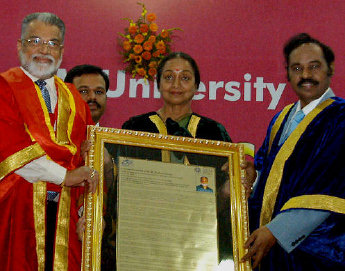 Lok Sabha Speaker Meira Kumar conferring an honorary degree of Doctor in Science on ISRO Chairman K. Radhakrishnan (left) at the convocation of SRM University in Kattankulathur, near Chennai, on Monday. Others in the picture are University Chancellor T.R. Pachamuthu (right) and Vice-Chancellor P. Sathyanarayanan. |
CHENNAI, Feb 8: Lok Sabha Speaker Meira Kumar asked the students to strive for social change in their your own ways; be it directly or indirectly and motivate others by inculcating in them the need to overcome centuries old prejudices which have no room or relevance in today’s world.
Addressing the students on the occasion of the convocation of the SRM University here on Monday, Mrs Kumar said the educated youngsters must have an inclusive approach to life. “Today the ground reality is that there is a social chasm on the basis of the caste, creed, class, gender, geography and language.”
She said “we need a concerted effort to bring about social change which can weaken these divisive forces, strengthen unity and accelerate our march for national progress. Being professionals you all should aim at disseminating the knowledge and expertise for the well being of the common man. It is imperative that the benefit of professional excellence should reach the last man in the society.”
In her convocation address, she said there was a need to humanise science disciplines to inculcate in the minds of students a perspective about the individual, the society, the nation and the world.
“It is essential even for engineers, doctors and scientists to understand the expectations of the nation and the society from them,” she said.
Her address drew spontaneous applause from the audience, even as she quoted Thiruvalluvar and Subramaniaya Bharati in Tamil.
Mrs Kumar said no nation could progress if half of its women population is not provided with adequate opportunities to participate in the national endeavour.
"You have to guard against social evils like gender discrimination, dowry system, domestic violence and female foeticide," she said.
Students from engineering and technology, the pure sciences, communications, management and the medical sciences were awarded their degrees. Rank holders received their certificates personally from Meira Kumar.
The university also honoured Dr K Radhakrishnan, chairman of the Indian Space Research Organisation, for his work in the field of space technology.
Prashantha Battacharya of B.Tech Computer science was awarded the “Corporation Bank’s Gold Medal” for the best outgoing student.
University chancellor TR Pachamuthu presided over the convocation and vice-chancellor P Sathyanarayanan presented the annual report of the University.
Presiding Officers' conference concludes
Creation of more States to weaken unity, integrity of India
By Deepak Arora
BHOPAL, Feb 4: The Seventy-Fourth Conference of the Presiding Officers of Legislative Bodies in India concluded here on Thursday.
The two-day in-depth deliberations by the Conference commenced on February 3 with discussion on the subject `Self-assessment by Legislature for Enhancing its Relevance', in which as many as 16 Presiding Officers participated in the discussion.
Carrying forward the fruitful deliberations on the items on the Agenda, the Conference took up the subject of "Creation of Smaller States – A National Perspective." In total, as many as 17 Presiding Officers participated in the discussion.
The participants were unanimous in their view that nothing is more sacrosanct than the unity and integrity of the country. A common refrain amongst the participants was that the clamour for creation of more and more States might tend to weaken the very edifice of the federal structure of our country.
In keeping with the present scenario, the broad view, which emerged, was that the matter needs to be discussed threadbare at the national level with the active involvement of all the political parties.
During the discussion on the functions of the Presiding Officers, as many as 12 Presiding Officers participated in the discussion. There was consensus by far among the participants that Speaker has to play a crucial role in administering the Legislature and its Secretariat.
In his capacity as the Presiding Officer of the House, he has to uphold the provisions of the Constitution and the Rules of Procedure and at the same time act as the mediator between the Government and the Opposition. As administrative head of the Secretariat, he has to ensure its independence and impartiality.
The Speaker has the onerous responsibility of ensuring on the one hand that the aspirations of the people are fulfilled through their representatives; on the other hand the Speaker has to develop and preserve healthy traditions and conventions of parliamentary institutions in general and parliamentary practices and procedures in particular.
Tomorrow, Chief Minister of Madhya Pradesh Shivraj Singh Chauhan will inaugurate a Symposium on Urgency in addressing the Needs of Environment and Conservation of Wildlife. Besides the Presiding Officers, Members of Parliament from Madhya Pradesh and Members of the Madhya Pradesh Vidhan Sabha will participate in the Symposium.
Legislatures should self-assess on meeting people's hopes: Meira
By Deepak Arora
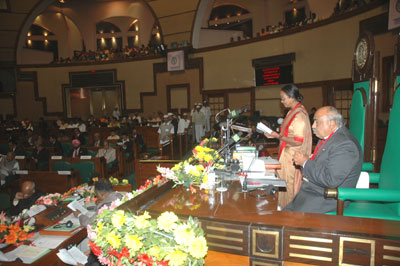 BHOPAL, Feb 3: Expressing concern over the gradual declining standards of legislatures in performing their duties, Lok Sabha Speaker Meira Kumar on Wednesday said there is a need for legislative bodies to make a self-assessment on meeting people's expectations from them.
BHOPAL, Feb 3: Expressing concern over the gradual declining standards of legislatures in performing their duties, Lok Sabha Speaker Meira Kumar on Wednesday said there is a need for legislative bodies to make a self-assessment on meeting people's expectations from them.
"In the recent past, there has been a general disquiet about the gradually declining standards of our legislatures in the performance of their duties," Mrs Kumar said while inaugurating the 74th Conference of Presiding Officers of Legislative Bodies in India at the State Assembly here.
The Lok Sabha Speaker said "debates and discussion, which are considered to be the hallmark of democracy, are often marked by disruptions, confrontations and various non-democratic alternatives."
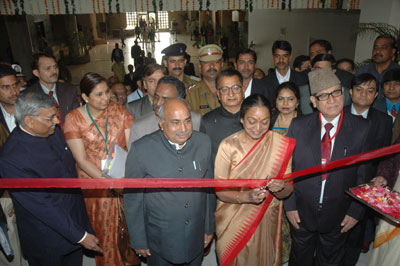 She said "Under the given circumstances, it becomes imperative that all legislative bodies across the country make self- assessment with regard to their functioning in the realisation of the urges, aspirations and expectations of the people."
She said "Under the given circumstances, it becomes imperative that all legislative bodies across the country make self- assessment with regard to their functioning in the realisation of the urges, aspirations and expectations of the people."
The Speaker said that the conference will deliberate on the topics -- "Self-Assessment by Legislature for Enhancing its Relevance", "Creation of Smaller States -- A National Perspective," and "The Role of Speaker in the Administration of Legislature".
The Speaker and Chairperson of the Conference Meira Kumar drew the attention of the delegates to the increase in the number of women in the Fifteenth Lok Sabha. She observed that it was notable that the present Lok Sabha has 59 women members, which is the highest ever representation of women so far.
Recapitulating some of the important parliamentary developments since the last Conference held in Chandigarh in September 2008, she recalled the Resolution adopted by the Fourteenth Lok Sabha condemning the terrorist attacks at several public places and prominent hotels in Mumbai in November 2008, which stated, inter alia, that India should not cease her efforts until the terrorists and those who had trained, funded and abetted them were exposed and brought to justice.
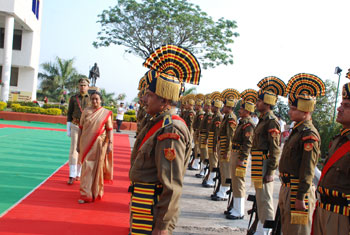 She hoped that Legislative Bodies would work towards the realization of the objectives of this Resolution in letter and spirit. In this regard, she referred to the passage of the National Investigation Agency Bill, 2008 by the Parliament during the Fourteenth Lok Sabha, which paved the way for setting up the National Investigation Agency at the Central level with the mandate to investigate and prosecute not only the offences affecting the sovereignty, security and integrity of the nation and our friendly relations with foreign countries but also the offences under the relevant Acts enacted to implement international treaties, agreements, conventions and resolutions of the United Nations, its agencies and other international organizations.
She hoped that Legislative Bodies would work towards the realization of the objectives of this Resolution in letter and spirit. In this regard, she referred to the passage of the National Investigation Agency Bill, 2008 by the Parliament during the Fourteenth Lok Sabha, which paved the way for setting up the National Investigation Agency at the Central level with the mandate to investigate and prosecute not only the offences affecting the sovereignty, security and integrity of the nation and our friendly relations with foreign countries but also the offences under the relevant Acts enacted to implement international treaties, agreements, conventions and resolutions of the United Nations, its agencies and other international organizations.
Highlighting the role of Parliament to make laws for strengthening the social fabric of our democracy through provisions of equal opportunity, Mrs Kumar lauded the Right of Children to Free and Compulsory Education Act, 2009 and hoped that the new law would be able to address the problem of increasing number of drop-outs from schools, especially in respect of those belonging to the disadvantaged and vulnerable sections of the society.
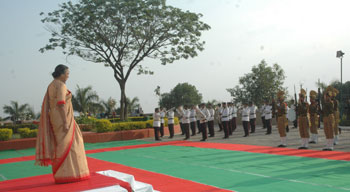 She further added that the Parliament had passed the Constitution (One Hundred and Ninth Amendment) Bill, 2009 to further extend the provision for reservation of seats in the Lok Sabha and the State Legislative Assemblies for the Scheduled Castes, Scheduled Tribes and the Anglo-Indian community for the next ten years, as they have not been brought at par with other sections of society.
She further added that the Parliament had passed the Constitution (One Hundred and Ninth Amendment) Bill, 2009 to further extend the provision for reservation of seats in the Lok Sabha and the State Legislative Assemblies for the Scheduled Castes, Scheduled Tribes and the Anglo-Indian community for the next ten years, as they have not been brought at par with other sections of society.
On the procedural front, she referred to her initiatives to amend the procedure relating to the Zero Hour and Rule 377 of the Rules of Procedure and Conduct of Business in Lok Sabha.
She also mentioned that the Fifteenth Lok Sabha had reconstituted the five Parliamentary Forums, one each on Water Conservation and Management; Youth; Children; Population and Public Health; and Global Warming and Climate Change, which were constituted during the Fourteenth Lok Sabha.
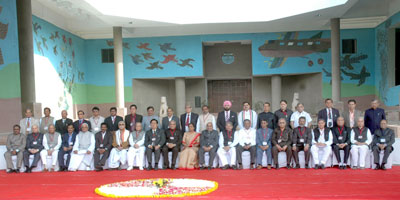 All these initiatives have been undertaken to provide a platform to the members of Parliament to have focused and meaningful discussions on critical issues facing the country and to enable them to effectively raise such issues on the floor of the House as also in the meetings of Parliamentary Committees and Forums, she added. She also hoped that the Presiding Officers of the State Legislatures might also consider constituting such Forums for the benefit of their members.
All these initiatives have been undertaken to provide a platform to the members of Parliament to have focused and meaningful discussions on critical issues facing the country and to enable them to effectively raise such issues on the floor of the House as also in the meetings of Parliamentary Committees and Forums, she added. She also hoped that the Presiding Officers of the State Legislatures might also consider constituting such Forums for the benefit of their members.
Dwelling upon the importance of maintaining the heritage character of the Parliament House Building, Mrs Kumar said that she had recently constituted a Joint Parliamentary Committee on Maintenance of Heritage Character and Development of Parliament House Complex which would be entrusted with the responsibility to formulate policies, guidelines and programmes on conservation, restoration, rehabilitation and maintenance works in the Parliament House Complex in accordance with the standard conservation principles and procedures.
She further stated that she had constituted a Standing Technical Committee under the chairmanship of the Secretary-General, Lok Sabha, consisting of, among others, famous architects, artists and other experts in the field to assist the JPC on Heritage.
Recalling the 20th Conference of Speakers and Presiding Officers of the Commonwealth in New Delhi in January 2010, Mrs Kumar expressed the feeling that the hosting of the Conference for the third time in India was certainly a recognition of the strength and vitality of India’s parliamentary democracy.
She added that the Conference gave an opportunity to the Presiding Officers of the Commonwealth Parliaments and Legislatures to come together to discuss issues and to exchange views in acquiring a deeper perspective into the problems and challenges faced by them in conducting parliamentary proceedings.
She said that meaningful discussions were held on different themes, viz. the Role of Speaker as a Mediator; Use of Technology in the Parliamentary Context; and the Role of Speaker in the Administration of Parliament.
Besides other things, the Conference was instrumental in evolving unanimity that the Speaker’s role in safeguarding the pride and prestige of Legislative Bodies is pivotal and the trust he/she enjoys is central to the administration of Parliament, the smooth functioning of which could be ensured through the adoption of ICTs and other technologies without compromising the sanctity of the Chamber as a debating forum, she added.
Referring to the first topic for deliberation during the ongoing 74th Conference, viz. Self-Assessment by Legislature for Enhancing its Relevance, Smt. Kumar said that there was a general disquiet about the gradually declining standards of our Legislatures in the performance of their duties. Debates and discussions, considered to be the hallmark of democracy, were often marked by disruptions, confrontations and various non-democratic alternatives.
In this backdrop, it had become imperative that all Legislative Bodies across the country make self-assessment with regard to their functioning in the realization of the urges, aspirations and the expectations of the people, she emphasized.
Speaking on the second topic, viz. Creation of Smaller States – A National Perspective, Mrs Kumar observed that, of late, there had been demands for carving out new States from the existing bigger ones as also for the creation of the Second States Reorganization Commission. She hoped that the Conference would discuss this issue in the national perspective.
As regards the third topic, viz., The Role of Speaker in the Administration of Legislature, she said that the Speaker has been constitutionally vested with definite powers in the running of the House from both administrative as well as legislative angles, and as such his or her role in the administration of the Legislature forms the bedrock of the entire legislative functioning.
Observing that the representational and legislative functions of the modern Legislatures have substantially diversified and increased, Mrs Kumar said that the Conference of Presiding Officers assumes considerable significance, for it gives an appropriate platform to the Presiding Officers of the Legislatures across the country to share and learn from one another’s experiences in making the working of their respective Houses more productive and useful.
Earlier, in his Welcome Address, Mr Ishwardas Rohani, Speaker, Madhya Pradesh Vidhan Sabha, said that Presiding Officers have great responsibility in meeting the expectations of the masses at large.
In this regard, he felt that, while they have to fulfill the rising expectations of the people, they also have to evolve effective rules of procedures to run the House without inviting allegations of prejudice, discrimination and injustice.
He lamented that, though the Chair derives strength from the House and runs the House in a neutral and unbiased manner, the decisions of the Chair are sometimes not given the due respect.
Referring to the expanding jurisdictions of the Legislatures owing to constitutional amendments and new laws being enacted, Shri Rohani pointed out that Legislative Bodies have now greater responsibility with regard to public welfare.
Dwelling upon the duty of the Presiding Officer to resolve the precarious situations in case of encroachment of constitutional boundaries, Shri Rohani said that the Presiding Officer has to maintain the decorum and dignity of the House, whereby the expectation and assurance of the masses is sustained.
Highlighting the role of Presiding Officer in management of the proceedings of the House, Mr Rohani said that he has to rely on his knowledge, experience, intelligence and conscience to take decisions legitimately. He added that a Presiding Officer sometimes finds himself alone and his impartiality on certain decisions questioned.
In the light of such experience, the Conference of Presiding Officers assumes greater importance as it provides a common platform to the Presiding Officers to evolve such procedures and rules through consensus which help them to effectively run the House and to strengthen parliamentary democracy.
The Inaugural Ceremony was attended by the Presiding Officers and Secretaries of the Legislative Bodies in India and several other distinguished guests.
Earlier in the day, Mrs Meira Kumar was given a Guard of Honour on her arrival at the ceremonial gate of the Vidhan Sabha Bhawan.
Subsequently, the Lok Sabha Speaker inaugurated an Exhibition titled Democracy in India: From Past to Present, organized by the Parliamentary Museum and Archives (PMA) Division of the Lok Sabha Secretariat in collaboration with the Directorate of Advertising and Visual Publicity (DAVP) and another Exhibition titled Development of the State, organized by the Madhya Pradesh Vidhan Sabha Secretariat.
The Exhibitions have been put up near the Central Hall of the Madhya Pradesh Vidhan Sabha Bhawan.
After the inauguration of the Conference, the Business Session dwelt at length on the agenda item Self-assessment by Legislature for Enhancing its Relevance, with the Speaker, Lok Sabha, and Chairperson of the Conference, Mrs Meira Kumar, in the Chair.
Mr K. Rahman Khan, Deputy Chairman, Rajya Sabha, in his speech, read out by Mr Charles Pyngrope, Speaker of the Meghalaya Legislative Assembly, said that the a vibrant legislature is the hallmark of a healthy democracy and that it must assess its own performance periodically in order to maintain its lasting relevance.
While carrying out an appraisal of its functions, it is in the interest of strengthening parliamentary democracy that such an assessment evaluates the efficacy of available rules, procedures, norms and conventions, he added.
He also felt that there is a greater challenge is to assess the quality of Legislature’s functions since there is no universal benchmark for quality assessment of its work and output.
Besides Mr K. Rahman Khan, Deputy Chairman, Rajya Sabha, a large number of Presiding Officers also participated in the lively discussion on the topic.
Parliament session from Feb 22
NEW DELHI, Feb 3: The Fourth Session of Fifteenth Lok Sabha will commence on February 22. Subject to exigencies of Government Business, the Session is likely to conclude on May 7.
The President will address both Houses of Parliament assembled together in the Central Hall of the Parliament House on the opening day of the session.
Meira Kumar to inaugurate 74th conference of presiding officers of legislative bodies
BY Deepak Arora
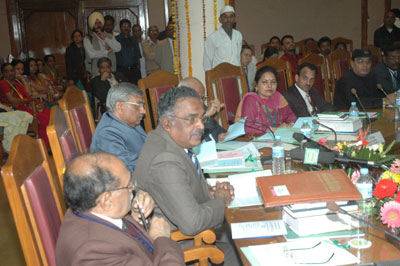 BHOPAL, Feb 2: Lok Sabha Speaker Meira Kumar will inaugurate the 74th conference of the presiding officers of legislative bodies here on Wednesday.
BHOPAL, Feb 2: Lok Sabha Speaker Meira Kumar will inaugurate the 74th conference of the presiding officers of legislative bodies here on Wednesday.
Vice Chairman of Rajya Sabha K Rehman Khan and Deputy Speaker of Lok Sabha Karia Munda are expected to attend the conference along with speakers and deputy speakers of 36 legislative bodies.
This is for the third time that the Conference is being held in Bhopal. Earlier, the 37th and 55th Conferences were held in Bhopal in 1971 and 1989, respectively.
The Conference will deliberate on three subjects, viz. (i) Self-assessment by Legislature for Enhancing its Relevance; (ii) Creation of Smaller States: A National Perspective; and (iii) The Role of Speaker in the Administration of Legislature.
The conference will come to an end on February 6.
The Speaker of Lok Sabha will also inaugurate two Exhibitions, viz. (i) Democracy in India: From Past to Present, set up by the Parliamentary Museum and Archives (PMA) Division of the Lok Sabha Secretariat and the Madhya Pradesh Vidhan Sabha in collaboration with the Directorate of Advertising and Visual Publicity (DAVP); and (ii) Development of the State set up by the Madhya Pradesh Vidhan Sabha Secretariat, tomorrow in the Vidhan Bhawan premises.
The Conference will be followed by a Symposium on Urgency in addressing the Needs of Environment and Conservation of Wildlife to be held on February 5.
Today, the Conference of Secretaries of Legislative Bodies in India was held in Committee Room No. 1 (Kailash) of the Madhya Sabha Vidhan Sabha Bhawan. The Conference was inaugurated by Shri P.D.T. Achary, Secretary-General, Lok Sabha, and the Chairman of the Conference. The Secretary-General, Rajya Sabha, Dr. V.K. Agnihotri, also spoke at the inaugural function. Dr. A.K. Payasi, Principal Secretary, Madhya Pradesh Vidhan Sabha, delivered the Welcome Address.
Recapitulating the major developments of parliamentary interest since the last Conference in Chandigarh in September 2008, Mr P.D.T. Achary, Secretary-General, Lok Sabha, referred to the mammoth electoral exercise and the subsequent constitution of the Fifteenth Lok Sabha, and the election of Mrs Meira Kumar and Mr Kariya Munda as Speaker and Deputy Speaker of Lok Sabha, respectively.
Referring to the 20th Conference of Speakers and Presiding Officers of the Commonwealth (CSPOC) held in New Delhi in January 2010, Mr Achary said that the Conference proved to be a grand success towards deliberating the multi-dimensional role of the Speakers and Presiding Officers and reinforcing the benchmarks of parliamentary democracy across the Commonwealth Parliaments.
Besides recalling other important developments in the Lok Sabha, Mr Achary informed the Delegates that the Report of the seven-member Committee to inquire into the complaints made by them regarding the alleged offer of money to the three members in connection with the voting on the Motion of Confidence was laid on the Table of the House on 15 December 2008.
Mentioning about the notices of question of privilege against the Prime Minister alleging that, by not coming to Parliament before operationalizing the Indo-US Nuclear Cooperation Agreement, he had violated the assurance given to the Parliament in his reply to the Motion of Confidence on 22 July 2008, he referred to the ruling of the Lok Sabha Speaker, which disallowed the notices of question of privilege.
Further, referring to the Report of the Liberhan Ayodhya Commission and the Memorandum of Action Taken by the Government of India thereon, Shri Achary invited the attention of the Delegates to the observation of the Hon’ble Speaker, urging the members to participate in the discussion on the emotive issue without hurting the sentiments of one another.
Recalling the institution of the Annual Parliamentary Lecture in the memory of Prof. Hiren Mukerjee, Mr Achary mentioned that the 2nd Prof. Hiren Mukerjee Memorial Annual Parliamentary Lecture was delivered by Prof. Muhammad Yunus, Nobel Laureate, on the theme Social Business: A Step toward creating a New Economic and Social Order, on 9 December 2009.
He also mentioned that the Lok Sabha Secretariat had brought out the Sixth revised edition of M.N. Kaul and S.L. Shakdher’s Practice and Procedure of Parliament which was released by the Speaker Meira Kumar, on December 14, 2009.
Referring to distinct work culture and rules of conduct of Legislature Secretariats, Mr Achary informed that a batch of Officers of the Lok Sabha Secretariat was sent to the first Foundation Course for the Officers of the Lok Sabha Secretariat at Dr. MCR Human Resource Development Institute of Andhra Pradesh and subsequently to other training institutes from January 2009 onwards.
The basic objective of the training was to provide a thorough grounding of the parliamentary officials and to inculcate in them a perceptive appreciation of the role of Parliament and its institutions.
Addressing the Conference, Secretary-General, Rajya Sabha, Dr. V.K. Agnihotri, outlined the significant developments in the Rajya Sabha since the last Conference in 2008. Among other issues, Dr. Agnihotri highlighted several initiatives taken by the Vice-President of India and Chairman, Rajya Sabha, Mr Mohammad Hamid Ansari, for ensuring the smooth functioning of the House.
In this context, he mentioned, inter alia, the steps taken to streamline the procedure of ‘Question Hour’, the computerization of the various activities which the Rajya Sabha Secretariat has undertaken, etc.
Highlighting the importance of the smooth flow of information, Dr. Agnihotri informed the Delegates about the various initiatives taken up by the Rajya Sabha to build an effective and constructive relationship between Parliament and the media, and the publication of a series of “Occasional Papers” on a wide range of topical issues.
Earlier, delivering the Welcome Address, Principal Secretary, Madhya Pradesh Vidhan Sabha, Dr. A.K. Payasi, highlighted the significance of the Conference as a forum for consultation and discussion in order to evolve effective and uniform Rules of Procedures and Conduct of Business and to resolve issues and problems faced by Legislatures.
Further, referring to the important role that Secretaries have to play, Dr. Payasi mentioned that the responsibility of Secretary of the Legislature is very extensive and wide ranging which requires them, besides other things, to act as the head of their respective Secretariats and chief advisor and consultant to the Presiding Officers, besides being the Secretary of the House.
Dwelling upon the various attributes that could help a Secretary in the efficient discharge of his duty, Dr. Payasi said that he has to possess the attributes of an efficient administrator, an expert in parliamentary functioning and a skillful diplomat.
Besides the Secretaries-General of the Lok Sabha and the Rajya Sabha, Principal Secretaries and Secretaries of State Legislatures in India attended the Conference.
The following subjects were discussed at the Conference: Confidence Vote after the General Elections to prove Majority: Should the Address by the President/Governor precede or succeed it?; Resignation of Members en masse and the implications thereof; Making the Question Hour more Efficient and Effective; Declining Participation and Presence of Members in Debates on Bills and Sittings of the House; Legislatures and the Model Code of Conduct of the Election Commission; Financial Autonomy of Parliament and Legislature Secretariats; and Confidentiality of Evidence tendered before a Parliamentary Committee vis-à-vis Disclosures under the RTI Act, 2005.
| Archives |
| Meira launches India's first magazine on Disaster Management |
Meira hoists National Flagon Republic Day |
Aviation
| Business | Defence | Foreign
Affairs | Communication | Health
| India | United Nations
India-US
| India-France | Entertainment
| Sports | Photo Gallery |
Tourism | Advertise with Us
| Contact Us
© Noyanika International, 2003-2009. All rights reserved.
 NEW DELHI, Oct 27: Ahead of the US President Barack Obama visit to India, the government has put on high security at the historical Central Hall of Parliament, where Obama will address to the MPs for not more than 20 minutes.
NEW DELHI, Oct 27: Ahead of the US President Barack Obama visit to India, the government has put on high security at the historical Central Hall of Parliament, where Obama will address to the MPs for not more than 20 minutes.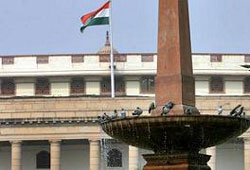 NEW DELHI, Oct 18: The Winter Session of Parliament will commence on 9th November, a day after US President Barack Obama addresses members of both the Houses at a joint sitting.
NEW DELHI, Oct 18: The Winter Session of Parliament will commence on 9th November, a day after US President Barack Obama addresses members of both the Houses at a joint sitting. 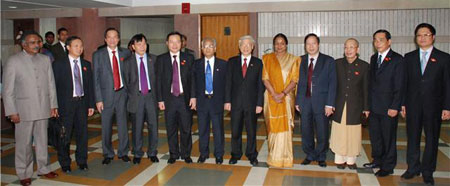 NEW DELHI, Feb 24: Welcoming a Parliamentary Delegation from Vietnam led by the Chairman of the National Assembly of Vietnam Mr. Nguyen Phu Trong today in Parliament Library Building, Lok Sabha Speaker Mrs Meira Kumar said that there exists a national consensus on Indo-Vietnamese relations in India and Vietnam is the centre of India’s Look East policy.
NEW DELHI, Feb 24: Welcoming a Parliamentary Delegation from Vietnam led by the Chairman of the National Assembly of Vietnam Mr. Nguyen Phu Trong today in Parliament Library Building, Lok Sabha Speaker Mrs Meira Kumar said that there exists a national consensus on Indo-Vietnamese relations in India and Vietnam is the centre of India’s Look East policy. NEW DELHI, Feb 24: Lok Sabha Speaker Meira Kumar on Wednesday rejected the Opposition demand of adjourning all other business to discuss rising food prices and said it would be taken up only after the Railway budget. This triggered a furore in the Opposition ranks, leading to the House being adjourned.
NEW DELHI, Feb 24: Lok Sabha Speaker Meira Kumar on Wednesday rejected the Opposition demand of adjourning all other business to discuss rising food prices and said it would be taken up only after the Railway budget. This triggered a furore in the Opposition ranks, leading to the House being adjourned.  NEW DELHI, Feb 23: After both the Houses of Parliament were adjourned for the day after an uproar on the issue of price rise, Congress has said govt has never run away from discussion nor will it ever do.
NEW DELHI, Feb 23: After both the Houses of Parliament were adjourned for the day after an uproar on the issue of price rise, Congress has said govt has never run away from discussion nor will it ever do. 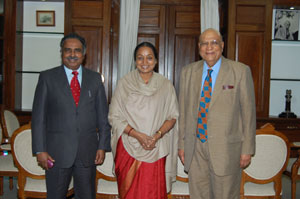 Lord Swraj Paul meets Lok Sabha Speaker
Lord Swraj Paul meets Lok Sabha Speaker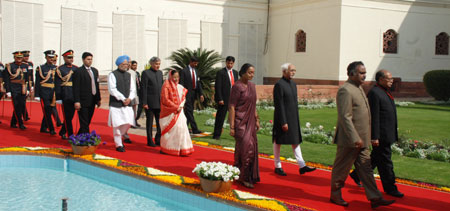 NEW DELHI, Feb 22: Indian President Pratibha Patil on Monday said that checking inflation and providing relief to 'aam aadmi' (common man) from higher food prices was her government’s top priority.
NEW DELHI, Feb 22: Indian President Pratibha Patil on Monday said that checking inflation and providing relief to 'aam aadmi' (common man) from higher food prices was her government’s top priority.  NEW DELHI, Feb 22: Appealing to the Opposition to allow smooth functioning of Parliament during the Budget session, Prime Minister Manmohan Singh on Monday said all issues agitating them can be debated on the floor of the House.
NEW DELHI, Feb 22: Appealing to the Opposition to allow smooth functioning of Parliament during the Budget session, Prime Minister Manmohan Singh on Monday said all issues agitating them can be debated on the floor of the House.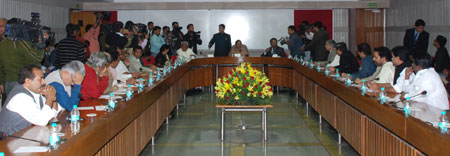 NEW DELHI, Feb 20: Lok Sabha speaker Meira Kumar on Saturday held a meeting of leaders of political parties to ensure smooth running of the Budget session of Parliament commencing from Monday.
NEW DELHI, Feb 20: Lok Sabha speaker Meira Kumar on Saturday held a meeting of leaders of political parties to ensure smooth running of the Budget session of Parliament commencing from Monday.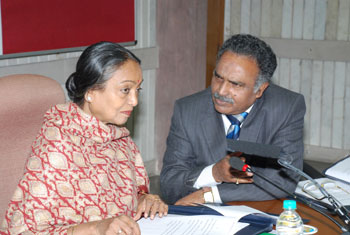 The Opposition Leader Sushma Swaraj said the BJP would raise issues like price rise, Foreign Secretary-level talks with Pakistan and the internal security situation in the session.
The Opposition Leader Sushma Swaraj said the BJP would raise issues like price rise, Foreign Secretary-level talks with Pakistan and the internal security situation in the session.